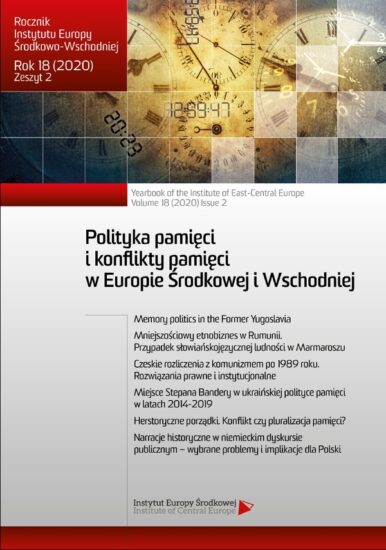ORCID: Tomasz Kosiek: 0000-0002-6798-6842
Pages: 85-101
Edition: Lublin 2020
DOI: https://doi.org/10.36874/RIESW.2020.2.5
Citation method: T. Kosiek, Mniejszościowy etnobiznes w Rumunii. Przypadek słowiańskojęzycznej ludności w Marmaroszu,„Rocznik Instytutu Europy Środkowo-Wschodniej” 18(2020), z. 2, s. 103-121, DOI: https://doi.org/10.36874/RIESW.2020.2.5.
Keywords:ethno-business, Maramureş, Rusyns, Ukrainians
Abstract: The author addresses the issue of ethno-business, which has been largely unresearched to date. In the approach proposed by the author, ethnobusiness is understood as a wide range of practices and behaviours related to the deliberate use of existing regulations going beyond the intentions of legislators that guarantee cultural and political privileges for national and ethnic minorities. Various activists and leaders gathered around ethnic organizations and co-creators of the discussed phenomenon most often pursue their private material or political interests. However, ethno-business is closely linked to the established Romanian legislation on national minorities. Thus, the author investigates the roots of this phenomenon, introducing readers to the regulations on minorities in Romania, and points to the social consequences of ethno-business. The analysis of the discussed problem is supplemented and illustrated by examples of specific behaviours observed by the author during his long-term and extensive ethnographic field research carried out on the Romanian-Ukrainian borderland between 2009 and 2010. Although this research project focused on aspects of ethnic and national identity among the Slavic-speaking community of the Maramures region, it also gave an opportunity to spot a number of behaviours that can be interpreted in the context of ethno-business. The ethnographic examples given in the article show how the policies related to the protection of national minorities in Romania can be exploited in various circumstances by different individuals who have relevant knowledge of the rights of national minorities.
Bibliography:
Alionescu C.-C., Parliamentary Representation of Minority in Romania, „Southeast European Politics” 2004, t. 5, nr 1, s. 60-75.
Artykuł 59.2, [w:] Konstytucja Rumunii, przeł. A. Cosma, 1996, http://libr.sejm.gov.pl/tek01/txt/konst/rumunia.html [02.10.2019].
Carstocea A., Accountability and political representation of national minorities: a forgotten link? Evidence from Romania, „ECMI Working Paper” 2013, nr 65, s. 3-25.
Carstocea A., Ethno-Business – the Manipulation of Minority Rights in Romania and Hungary, [w:] Perpetual Motion? Transformation and Transition in Central and Eastern Europe & Russia, red. T. Bhambry i in., London 2011, s. 16-28.
Carstocea A., ‘Ethno-business’. The unexpected consequence of national minority policies in Romania, [w:] Informal Relations from Democratic Representation to Corruption. Case Studies form Central and Eastern Europe, red. Z. Mansfeldova, H. Pleines, Stuttgart 2014, s. 163-183.
Comaroff J. L., Comaroff J., Etniczność sp. z o.o., Kraków 2011.
Decker D. C., The Use of Cultural Autonomy to Prevent Conflict and Meet the Copenhagen Criteria: The Case of Romania, „Ethnopolitics” 2007, t. 6, nr 3, s. 437-450, https://doi.org/10.1080/17449050701487454.
Dobos B., The Role of Elections in Minority Contexts: The Hungarian Case, [w:] The Challenge of Non-Territorial Autonomy. Theory and Practice, red. E. Nimni, A. Osipov, D. Smith, Oxford i in. 2013, s. 163-180, https://doi.org/10.3726/978-3-0353-0511-1/16.
Eriksen T. H., Małe miejsca, wielkie sprawy. Wprowadzenie do antropologii społecznej i kulturowej, Warszawa 2009.
Federal Union of European Nationalities, Minority SafePack Initiative, http://www.minority-safepack.eu/assets/downloads/booklet/MSPI_brochure_PL.pdf [29.07.2020].
Horváth I., Scacco A., From the Unitary to the Pluralistic. Fine-Tuning Minority Policy in Romania, [w:] Diversity in Action. Local Public Management of Multi-Ethnic Communities in Central and Eastern Europe, red. A.-M. Biro, P. Kovacs, Budapest 2001, s. 241-271.
Hungarian Helsinki Committee, The Situation of Minorities in Hungary, 1999, http://www.minelres.lv/reports/hungary/hungary_NGO.htm [29.07.2020].
Iwański T., Odpowiadaj w języku, w jakim cię pytają, „Tygodnik Powszechny”, 25.11.2019, https://www.tygodnikpowszechny.pl/odpowiadaj-w-jezyku-w-jakim-cie-pytaja-161217 [24.02.2020].
Kosiek T., Ethnicity Has Many Names: On the Diverse Acts of Identification with the Example of the Ukrainian Minority in the Romanian Region of Maramureş, [w:] Sterile and Isolated? An Anthropology Today in Hungary and Poland, red. W. Kuligowski, R. Papp, Poznań – Wielichowo 2015, s. 111-127.
Kosiek T., Porewolucyjne transformacje rumuńskiej polityki wobec mniejszości narodowych, „Rocznik Instytutu Europy Środkowo-Wschodniej” 2015, t. 13, z. 1, s. 171-188, https://doi.org/10.36874/riesw.2019.
Kosiek T., „Ukraińska” mniejszość narodowa w rumuńskim Maramureszu i problemy jej tożsamości, Poznań 2014 [rozprawa doktorska].
Kramar R., Rola spuścizny cyrylo-metodiańskiej w zachowaniu tożsamości narodowej Ukraińców Rumunii, „Studia Wschodniosłowiańskie” 2014, t. 14, s. 345-360, https://doi.org/10.15290/sw.2014.14.27.
Kureljak V., Ukrajinci Rumuns’koji Maramorszczyny, Lviv 2001.
Lenio P., Etnokul’turni procesy v seredovyszchi ukrajinciv Maramorszczyny, „Narodna tvorchist’ ta etnohrafija” 2010, nr 3, s. 36-46.
Magocsi P. R., Narod nizvidky: Iljustrovana istorija karpatorusyniv, Użhorod 2006.
Minority SafePack Initiative, FAQ, http://www.minority-safepack.eu/#faq.
Mohacsek M., Analiza finanţărilor alocate organizaţiilor minorităţilor naţionale, „Working Papers in Romanian Minority Studies” 2009, nr 16.
Pap A. L., Human Rights and Ethnic Data Collection in Hungary, „Human Rights Review” 2008, t. 9, nr 1, s. 109-22, https://doi.org/10.1007/s12142-007-0032-4.
Protsyk O., Representation of Minorities in the Romanian Parliament, Geneva – New York 2010.
Ram M., Romania: From Laggard to Leader? [w:] Minority Rights in Central and Eastern Europe, red. B. Rechel, London 2009, s. 180-194.
Smith A., Nacjonalizm. Teoria, ideologia, historia, Warszawa 2007.
Tesser L. M., The Geopolitics of Tolerance. Minority Rights under EU Expansion in East-Central Europe, „East European Politics and Societies” 2003, t. 17, nr 3, s. 483-532, https://doi.org/10.1177/0888325403255310.
UUR Suceava 2012, YouTube, 22.07.2012, https://www.youtube.com/watch?v=3oTQXD8ac1A [29.07.2020].
Verdery K., Nationalism and National Sentiment in Post-socialist Romania, „Slavic Review” 1993, t. 52, nr 2, s. 179-203, https://doi.org/10.2307/2499919.
Zahra T., Imagined Noncommunities: National Indifference as a Category of Analysis, „Slavic Review” 2010, t. 69, nr 1, s. 93-119, https://doi.org/10.1017/s0037677900016715.
Zan M., Rusyns’kyj ruch u suczasnij Rumuniji: identyfikacija, struktura, refleksiji, „Narodna tvorchist’ ta etnohrafija” 2011, nr 2, s. 74-86.
Keywords:ethno-business, Maramureş, Rusyns, Ukrainians
PDF: Download